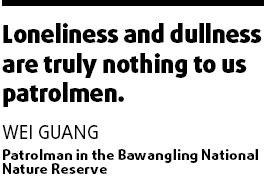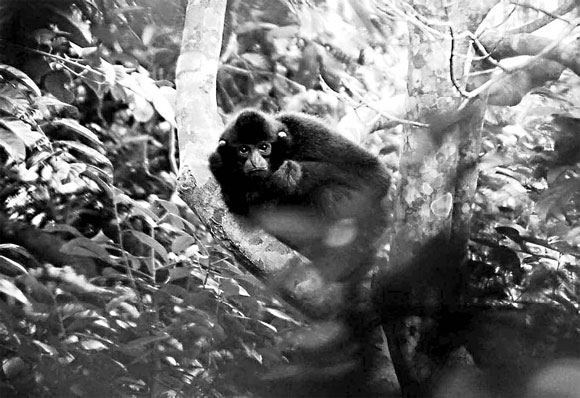Catching jungle fever
|
A male Hainan black-crested gibbon lives in the Bawang-ling National Nature Reserve in Hainan Province.Xiao Shibai |
Hidden in one of the country's few unspoiled tropical forests and encircled by overgrown bushes and dense tropical trees, the Dong'er (Eastern No 2) Patrol Station of Bawangling National Nature Reserve is a compound with a two-storey building and a small garden.
For two days a week, 39-year-old Wei Guang is the only host at the station, which is more than 10 kilometers away from Dongyi (Eastern No 1), another patrol station, and 23 kilometers away from the town at the foot of Mount Bawangling in western Hainan Province.
There the patrolman manages a checkpoint on the bumpy dirt road running through the reserve. He is also responsible for keeping outsiders without permits away from the reserve core area.
He usually gets up at 7:00 am, starts checking the incoming cars and motorcycles around 8:30 am, has lunch at 12:00, works again after a nap, has dinner between 5:30 pm and 6:30 pm, and goes to bed after a cold water shower around 9:00 pm. During the wet season, when it's not raining, Wei also cleans a 2-kilometer-long plank roadway zigzagging into the jungles.
Wei's only company in the building at night is a brood of chickens and a few rats. Home-brewed rice liquor and pork stewed in a rice cooker are his two major sources of enjoyment.

"Loneliness and dullness are truly nothing to us patrolmen," Wei says. "Compared to my old job, the work here is good."
Wei was just transferred to Dong'er at the end of September. His old job was to keep an eye on one of the world's most endangered creatures - the Hainan black-crested gibbon.
With only 17 gibbons and two gibbon families left in the core area of the Bawangling reserve, it is one of the world's 25 most endangered primates, according to a recent report by the World Conservation Union and the International Primatological Society in collaboration with Conservation International. Ravaged by poaching and habitat loss, the island province's primate population has shrunk from about 2,000 to 13, according to a 2003 survey.
Since then, the reserve administration has strengthened its protection efforts, assigning eight patrolmen to monitor the gibbons, year-round.
"We have to try to see the gibbons almost every day," Wei says.
To do that, Wei and his colleagues must stay at Nanchahe Patrol Station, a rain forest campsite near where the gibbons sleep high in the tropical trees.
Wang Wenyi, head of the reserve's research team, says the gibbons are rarely seen on the forest floor and keep changing their sleeping spots in the canopies.
"Fortunately, the gibbons like calling in the morning and at dusk," Wang says. "Our rangers depend on the calls to follow their positions."
The rangers will try to approach the gibbons after these calls. Sometimes they can hear the calls close to their field station, Wei Guang says. Most of the time, however, they are a few ridges away. "In that case, we have to trek through the jungle in a hurry, often from early in the morning to late at night," he says.
In the primary forests, where there are no paths, the rangers have to climb up ridges or rush down slopes by breaking through brambles and thorns or even swinging from branch to branch.
"Like the gibbon on land, I can rush down a 100-meter-long slope in five minutes," Wei says.
In the jungle, there are loads of mosquitoes, leeches and bugs that bite, but Wei doesn't mind so much. "They are no big deal," he says.
After finishing middle school, Wei hunted and logged in the region until 1998. He says he can survive in the jungle for a couple of days with only a lighter.
|
Chen Qing (left) helps Wei Guang move the road fence in front of the Dong'er station.Chen Liang |
The biggest difficulties come from eating irregularly and living in extreme conditions.
The wet season starts in May and lasts until November, Wei says. During that period, it rains almost every day. Even during the dry season, the humidity level rises to more than 50 percent.
"Ten minutes after you start looking for the gibbons, your clothes are drenched with sweat," he says. "When you go to bed, you find that your quilt is wet too.
"That's why everyone who monitors the gibbons develops both stomach problems and arthritis."
His colleague at Dong'er was also a gibbon ranger, he says. He was transferred there from Nanchahe for health reasons.
"Compared to him, I'm much healthier," Wei says. "So, I have to return to Nanchahe after a three-month break at Dong'er."
However, Wei and most of his colleagues are "not the reserve's regular employees".
"I can earn a salary of 500-600 yuan ($66-79) a month, which is certainly not enough for me to raise my two children."
Wang Wenyi says that the funds given to the reserve are just enough to cover a small number of permanent staff. "The reserve has only 13 regular employees, including myself," he says. "Our budget from the local government is less than 500,000 yuan ($65,703) a year."
But the reserve covers an area of nearly 30,000 hectares and has three patrol stations, two checkpoints, and four protection spots. "So, we can only use subsidies from the central government's Natural Forest Protection Project to pay our 50 patrolmen's salaries," Wang says. "That's why it's so low."
As one of the regular employees, Chen Qing, the reserve's self-taught wildlife expert, says that he can earn 1,600 yuan ($210) a month. But he has worked for the reserve since 1984.
"I stayed at a research site near Dong'er for eight years," says the 48-year-old. "In those days there was no road between Dong'er and the town. We could only walk home once a week for a day."
He was transferred back to the town's headquarters two years ago. "I'm just too old to monitor the gibbons," he says.
At Dong'er, Wei Guang is scraping by. Yesterday, he killed a rat in the compound and cooked it for dinner. For a man who has spent most of his working time in the wild, rat's meat is a reasonable meal.
"They're certainly cleaner than the house rats in the town," he says. "I will wipe out them, one by one."
(China Daily 11/08/2007 page20)
















